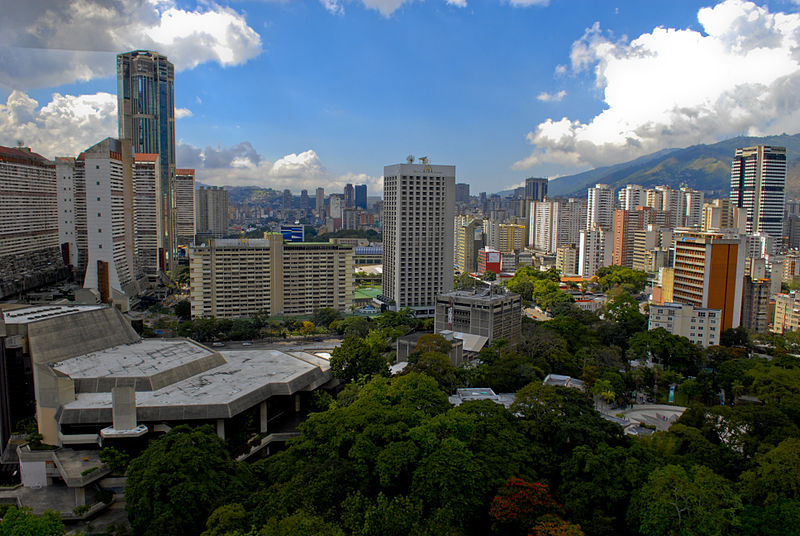
By Peter Tase
Bilateral relations between Venezuela and Panama reached their lowest point, after the statement made by President Maduro in March 5th, 2014, when he accused Panama’s leader, Ricardo Martinelli for orchestrating a foreign interference in the internal affairs of Venezuela, when the latter called upon the Organization of American States to look into the recent political turmoil in Caracas. Such a diplomatic break down will show its immediate economic consequences that will affect the people of Venezuela and its overall trade and industry.
In Venezuela, consumer products are reaching their lowest supply levels in its markets as well as revenues and citizens’ incomes are being hit hard by inflation and a very weak economy. Only last month’s production, supply of commodities was reduced to 28 percent.
Steve H. Hanke, a renowned U.S. economist at CATO Institute, has the following assessment: “a hallmark of socialism and interventionism is failure. Venezuela is compelling proof of this, having spent the past half century going down the tubes. Indeed, in the 1950’s, it was one of Latin America’s most well off countries. No more. Now it is a basket case – a failed state that’s descending into chaos…After all, Venezuela’s combined reserves of oil and gas are second only to Iran’s. Well, it might have reserves, but thanks to the wrongheaded policies of President Hugo Chavez, Venezuela is the only major energy producer that has seen its production fall over the past quarter of a century.” [1]
Indeed, according to Roberta Stabile, “Venezuela is a country that practically operates only with imported products, because its domestic products are not enough in order to fully satisfy the consumers’ demand across the country.” Imported products that come from Panama reach over 30 percent of the total amount of commodities being shipped to Venezuela. [2]
According to Francisco Chirinos, a Venezuelan economist, “[Maduro’s] decision was a wrong move and in a very unsuitable time, because Panama and Venezuela have strong commercial relations for more than forty years; there were pending loan accounts that reached around US$ 2 billion, which have to be paid to the Panamanian private sector. Venezuela due to its currency crisis and its national reserves have reached its lowest levels historically, has recently encountered many obstacles to pay these loans.”
For Mr. Chirinos “it would be impossible for Venezuela to pay back these loans, due to the fact that its national treasury is in a greater shortage of foreign currency, by breaking these relations, for political reasons, this implicates that these accounts will be suspended as well as the purchase of Panamanian products will be interrupted.”
Now such trade and commercial transactions are expected to flourish with other regional nations such as Brazil and Argentina. One thing is certain that if the current political crisis persists, Venezuelan markets will subsequently be empty as well as food supplies will experience a major price hike in the weeks and months ahead. On the other hand, Venezuela was the 14th largest goods and services trading partner to the United States, totaling US$ 62 billion in 2011. U.S. exports totaled US$ 18 billion and imported products from Venezuela reached US$ 44 billion. [3] Just like Panama, United States has called upon President Nicolas Maduro to renounce violence, respect democratic values, standards as well as the freedom of expression in the recent protests led by national leaders of the opposition party and majority of university students. Trade ties between United States and Venezuela are also expected to shrink. Especially when Nicolas Maduro blamed the “fascist right” for anti-government protests, that were allegedly backed by the United States and former Colombian President Alvaro Uribe, in order to encourage a plot for his dismissal. [4]
The abrupt disruption of political relations with Panama made it impossible for Venezuela to renegotiate its pending terms and conditions on the pending loans it has to pay to its neighboring country.
President Maduro’s statements will be followed by concrete actions that will cause a deep fracture in the commercial relations between both countries; additionally Venezuelan businesses will not be able to conduct commercial exchanges in the Free Trade Zone of Colón. As a result reduction of consumer products in Venezuelan grocery markets will reach a shortage greater than 30 percent, in the next months.
For Teodoro Bellorín, President of the Chamber of Commerce in Margarita, “this will be another challenge in addition to the negative liquidation of foreign currency, from private imports on behalf of the government. Economic Crisis has deteriorated in the Caribbean nation, not only because of the shortage but also due to such a bilateral commercial disruption with Panama.” There are strategic bilateral commercial relations among many suppliers in the Free Trade zone of Colón; 70 percent of Venezuela’s imported products, are purchased and transported from Panama’s ports.
From the economics point of view this is not suitable to Venezuela; it has no reasons to break relations with Panama, a country which has the highest percentage of commodities being shipped from its territory to Venezuelan consumers and market. These political actions bring no benefits to Caracas’ economic policies and further ruin its currency’s inflation rate.
According to Prof. José Ramón Acosta, a renowned Venezuelan economist, “from Maduro’s recent measures the consequences will not be suffered by the Panamanian people, unfortunately Venezuelans will feel a tremendous pain. The economic situation is precipitating from bad to worse, because the country has a centralized economy and controls the markets, inflation rate and price and this is what is generating a deep shortage.”
Prof. Acosta highlights that “there is an important element which is a default on the part of Venezuelan government, the break of relations was just smoke in the glass to distract the public from its government’s inability of making payments on time to Panama’s government.”
[1] http://www.cato.org/blog/venezuelas-plunging-petroleum-production
[2] http://elcomerciomovil.com/web/economia/economia-nacional/economia-a-un-ano-sin-chavez-estamos-cosechando-las-irresponsabilidades-de-las-politicas-gubernamentales/
[3] http://www.ustr.gov/countries-regions/americas/venezuela
[4] http://www.upi.com/Top_News/Special/2014/02/21/Argentina-Brazil-said-to-fret-over-Venezuela-spillover/UPI-43461393013376/#ixzz2vzqqsf1N




